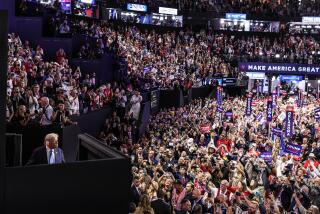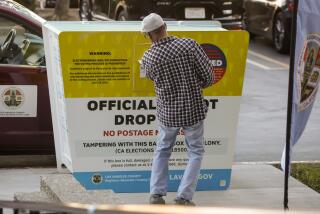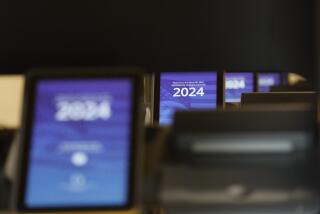Early voting forces presidential campaigns to alter tactics
DES MOINES — A decade ago, strategist Karl Rove launched the Republican Party’s 72-hour plan: a massive door-knocking and phone effort in the final three days before the election that helped generate victories in 2002 and 2004. Early voting this year has rendered Rove’s idea obsolete.
Ballots have landed on kitchen tables in North Carolina, where two-thirds or more of the vote will probably be cast early. In-person voting starts Thursday in Iowa, a swing state where election season has assumed biblical proportions: 40 days and nights leading up to Nov. 6. Before this month is out, 30 states will be voting. And when election day dawns, more than 45 million Americans are expected to have already voted, a record number.
This galloping trend is altering the calculus of the presidential campaigns, particularly in battleground states.
“The fact is that voting has changed dramatically,” said Rick Wiley, political director of the Republican National Committee. Early voting “moves everything up.”
The campaign ad wars, which used to peak toward the end of October, are expected to reach maximum intensity by the first of the month. Thirty-two states and the District of Columbia allow voters, without any excuse or justification, to cast ballots in person prior to election day, according to the National Conference of State Legislatures.
Early voting is often promoted as a convenience for harried citizens. But it may be a bigger boon for candidates, enabling them to deploy money and personnel more efficiently as they work to corral votes as soon as possible.
“By encouraging our supporters to vote early, we can focus our resources more efficiently on election day to make sure those less likely to vote get out to the polls,” said Adam Fetcher, an Obama campaign spokesman. “We’ve made early investments in battleground states, where we’ve been registering folks and keeping an open conversation going with undecided voters for months.”
Using advanced technology, campaigns track, or “chase,” voters who request absentee ballots, often on a daily basis, until they are turned in. Then the campaign moves on. After someone votes early, “You stop sending them mail. You stop calling them. You don’t need to knock on their door anymore,” said a senior Obama campaign aide, who requested anonymity because he was not an authorized spokesman.
In Iowa, trekking to the polling place is an election day ritual for habitual Republican voters, said a Mitt Romney strategist. So the campaign is putting its emphasis instead on banking early votes from Iowans who favor the Republican nominee but whose voting histories indicate that they can be unreliable.
Initial indications from Iowa favor Democrats, who made an early push for absentee ballots and have requested nearly six times as many as GOP voters. The Romney camp says Republicans are catching up and that mailings went out recently to their side.
Early voting can insulate a candidate against a damaging gaffe or negative news story in the closing weeks before election day. The disclosure of a decades-old drunk-driving charge against George W. Bush five days before the 2000 election may have cost him as many as five states, Rove, his chief strategist, later wrote. Late damage could be reduced this year, when more than 35% of the vote is expected to be cast early, compared with less than 15% in 2000.
But the dynamic works both ways. Early voting could mute the boost from a positive event — like a strong showing in this year’s final televised debate on Oct. 22, only 15 days before the election.
Paul Gronke, who directs the Early Voting Information Center at Reed College in Portland, Ore., says most early voters don’t cast their ballots until the final week or two before an election. “The real danger period for candidates is three or four days before the election,” he said.
In most of the 2012 battleground states, half or more of the vote will come in early, according to campaign officials. “North Carolina, Florida, Colorado, Nevada, Ohio, Iowa. There’s a path to 270 [electoral votes] right there,” said Rich Beeson, political director for the Romney campaign, listing states where early voting is expected to top the national average. But early voting rules vary widely from state to state, as do strategies and tactics for pursuing voters.
Students, for example, are a major Obama target. But snail mail is increasingly useless in reaching them — many no longer have mailboxes in their dorms — complicating efforts to harvest absentee ballots. So in Iowa and other states, Democrats are emphasizing satellite voting locations on or near college campuses.
First Lady Michelle Obama recently delivered an early-vote message, tinged with humor, to students at a pair of colleges in North Carolina, where early voting sites on some campuses open Oct. 18.
“We know students, right? The alarm goes off late on election day,” she said to laughter from an East Carolina University audience. “Maybe you forget what day it is. You thought Tuesday was tomorrow, and it’s really today. You don’t want to count on that, right? So vote early.”
Behind the joking is a reality of the reelection fight: The surge of young-adult excitement from 2008 has dissipated, forcing Obama to work harder to squeeze as many votes as possible from those under 30.
Republicans are targeting early voting locations at or near mega-churches, where large numbers of GOP-leaning evangelical Christians worship. In the 2010 election, early voting was held at the same time as Sunday services for two evangelical congregations in Ames, Iowa. Nationally, the Faith and Freedom Coalition is urging conservative Christians in at least 10 swing states to register and vote early.
For the first time, the Ohio secretary of state, a Republican, is mailing absentee ballot applications — twice — to every registered voter, moving his state closer to Washington and Oregon, where voting is entirely by mail.
In California, which pioneered no-excuse absentee voting in 1978, 41.7% of the presidential vote was cast by absentee ballot in 2008, according to the U.S. Election Assistance Commission. That figure is expected to increase this fall.
In Nevada, early polling places are like pop-up stores, sometimes open for a brief period of time. Figuring out which precincts to target to flush out voters becomes another part of the early voting challenge — before the voting machines move from the Albertsons to the Smith’s down the street.
“It is a campaign within a campaign,” Wiley said.
Republicans say they have stepped up their early voting game, narrowing a gap that benefited Obama last time. At the same time, Republican lawmakers have attempted to impose restrictions on early voting in several states since the 2008 election.
One of the most controversial curbs was in Florida, the largest swing state, where Republican Gov. Rick Scott and the GOP-controlled Legislature outlawed early voting on the Sunday before election day, while allowing it on the previous Sunday.
The change will have the effect of blunting a voter mobilization practice that benefits Democrats. Known as “souls to the polls,” it involves busing large numbers of people to voting sites after church services just two days before the election. According to researchers, including those at New York University law school’s Brennan Center for Justice, blacks and, to a lesser degree, Latinos are more likely to use early voting on Sunday than other groups.
The Florida change could also mean a bigger election day crush at polling places in inner-city neighborhoods. Local Democrats fear that some minority voters will be discouraged by long lines and go home without voting. But Obama aides play down any potential harm, contending that their turnout efforts will generate a record number of early votes in Florida anyway.
Romney used absentee voting to great effect in his pivotal Florida primary victory over Newt Gingrich last winter, and Republicans are projecting that 70% of Floridians will vote early, up from 51% in 2008.
While early voting is a convenience for some, it’s a matter of conviction for others. Many can’t wait until November to register support for their candidate — or intense opposition to the other guy. As for the relatively few undecideds in the middle, research indicates that they are less likely to vote early than partisans on either side, preferring to wait until the last minute to make up their minds — if they vote at all.
More to Read
Get the L.A. Times Politics newsletter
Deeply reported insights into legislation, politics and policy from Sacramento, Washington and beyond. In your inbox three times per week.
You may occasionally receive promotional content from the Los Angeles Times.










